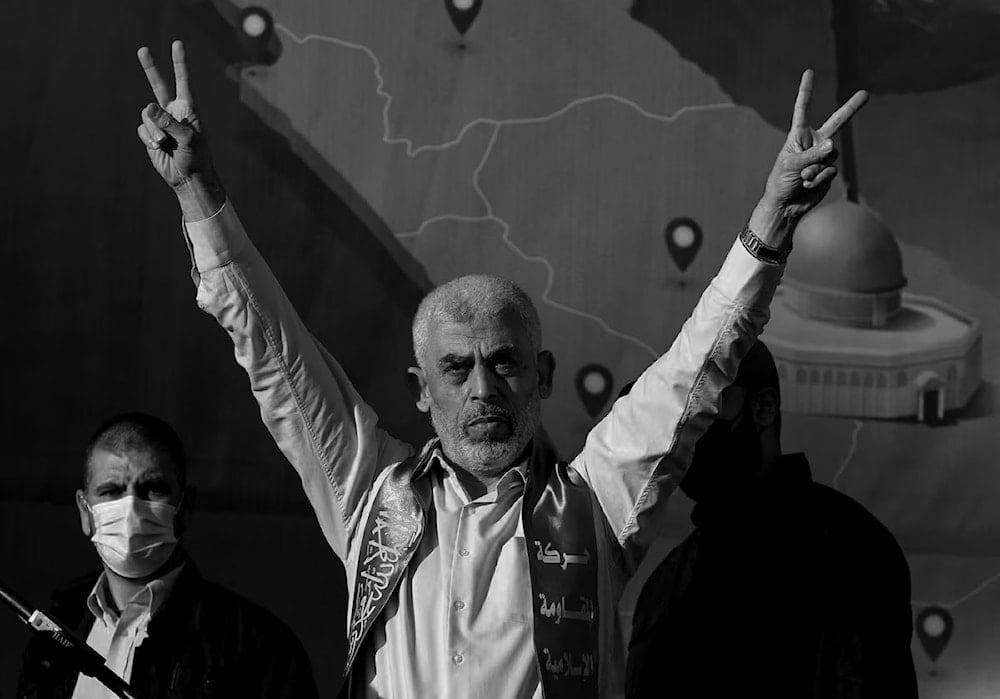'Israel' raves at Sinwar's death, did not anticipate impact: Guardian
The Guardian examines the strategy of killing Resistance leaders, affirming that the aftermath remains blurred and unknown to those who celebrate their deaths.
-

Martyred Hamas leader, Yahya Sinwar, undated. (Social Media)
It appears as though "Israel" was too quick to celebrate the martyrdom of Hamas leader Yahya Sinwar, as experts discuss the aftermath and consequence of targeting or assassinating the leaders of Resistance groups, with some labeling it as counter-productive.
The Guardian examines a series of assassinations as part of the "decapitation strategy", displaying the impact on the movements themselves, giving the examples of Iraq, Vietnam, Bin Laden and the 9/11 attack, and the Taliban in Afghanistan, and the change that struck their movements or groups post-killing.
While some lost significant value and were deterred, others, like the Taliban, managed to recover and reassume governance and control of Afghanistan in 2021.
Remarkably, however, The Guardian also reels back to the Israeli assassination of Martyr Sayyed Hassan Nasrallah and the entire top leadership of Hezbollah.
In this context, it said "this combination of 'decapitation' and straightforward attrition is virtually unprecedented," meaning that the direct assassination of the leadership while simultaneously attempting to exhaust the movement was a rare strategy.
However, Hezbollah's operations and recent escalation prove that the strategy not only failed but manifested the group's resolve and rapid recovery.
In the case of Hamas, "Israel" has been assassinating its leaders and prominent officials for the past two decades, from Sheikh Ahmed Yassin to martyr Ismail Haniyeh, and now martyr Yahya Sinwar.
According to The Guardian, "each death has forced change, but rarely that anticipated."
The history of decapitation strategies shows that it's nearly impossible to predict the outcome of killing a leader. While this uncertainty may not concern those ordering the assassinations or those celebrating the success, factors like politics and a natural desire for retribution and justice play a significant role.
However, any celebration in "Israel" or elsewhere over Sinwar's death should be tempered by the understanding that the future remains unpredictable, according to the newspaper. It could mark the beginning of the end of the Gaza war, but past experiences with such killings indicate that a decisive victory remains unlikely in the long run.
'Hamas lives on, after Sinwar'
According to Steven A. Cook, it has become a cliché to assert that "you cannot kill an idea."
Cook writes in Foreign Policy that although Palestinian martyr Yahya Sinwar was the mastermind of Operation al-Aqsa Flood and "Israel" believes it achieved a great deal by murdering him, many various leaders of different resistance movements in Lebanon and Palestine helped build the "mythology of Israel’s security services."
Despite this, Cook asserts that "Israel" still has not managed to defeat armed resistance factions.
He details how Sayyed Hassan Nasrallah made Hezbollah one of the greatest resistance movements in the region after the death of Sayyed Abbas al-Mousawi in 1992 and how subsequently, following the martyrdom of Sayyed Nasrallah and significant leaders within Hezbollah, it has still launched an unprecedented barrage of rockets at "Israel".
Sheikh Ahmad Yassin, the early leader of Hamas, similar to Sayyed Nasrallah, was also martyred in an airstrike. Cook notes that if his violent death didn't lead his successors to rethink their approach, why would Sinwar's killing have any different result?
Although some believe Sinwar's death could weaken Hamas, Cook emphasizes that resistance is a "critical component of identity," detailing how Sinwar preferred to meet his end from an Israeli tank shell rather than a natural cause, believing that his martyrdom would serve as motivation for further resistance.
"That Israel killed Sinwar seems like a major achievement today, but in time, others will rise—as they always have—to continue to resist," he concludes.
Read more: 'Israel's' killing of Yahya Sinwar is no turning point: FP

 4 Min Read
4 Min Read








